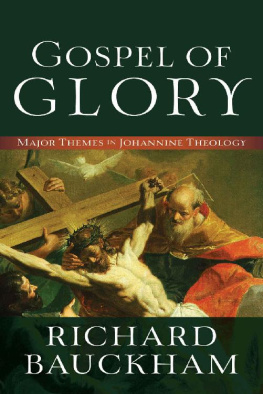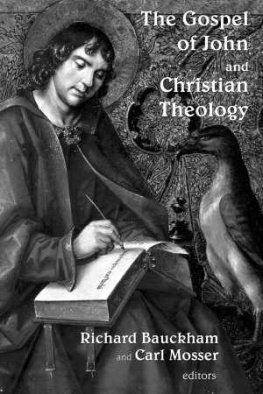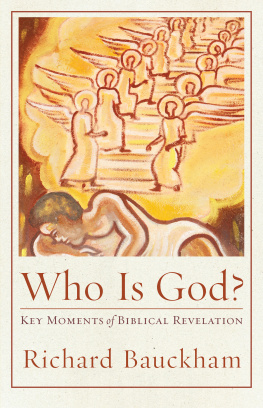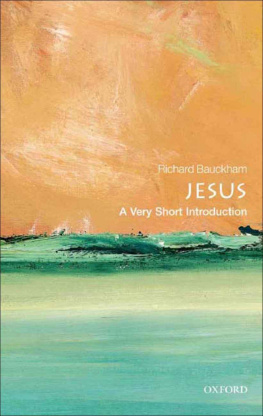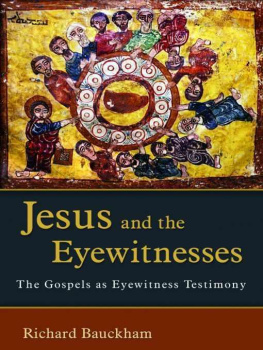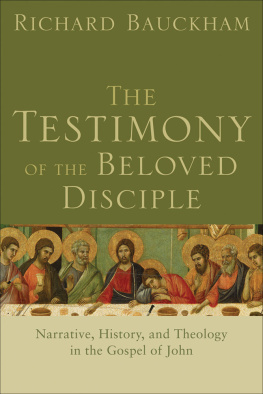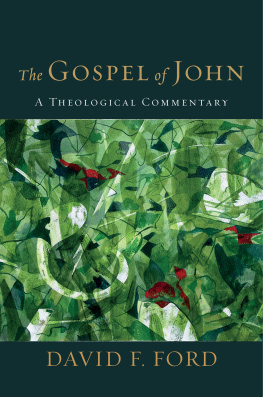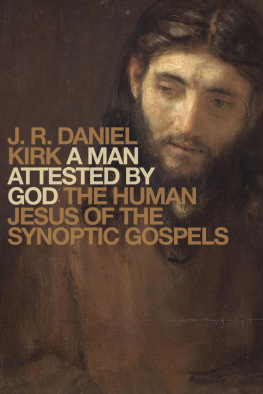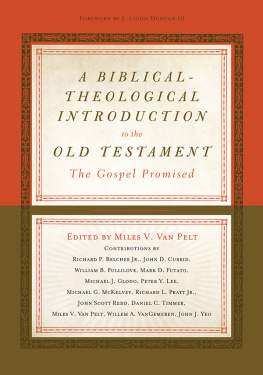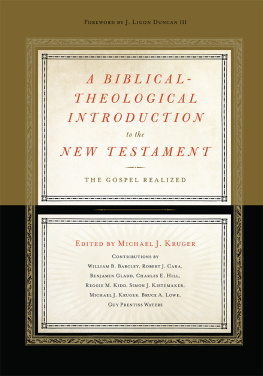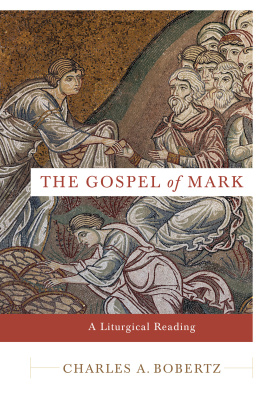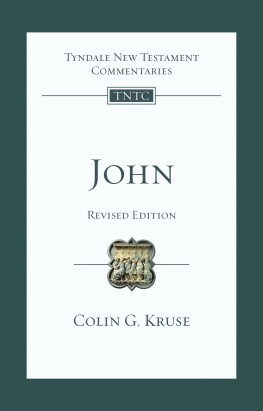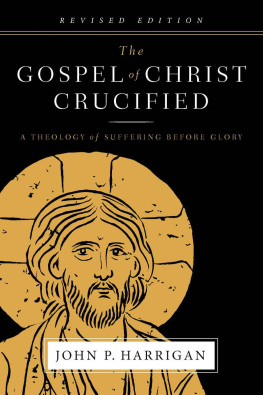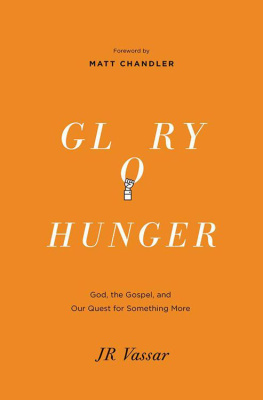Richard Bauckham - Gospel of Glory
Here you can read online Richard Bauckham - Gospel of Glory full text of the book (entire story) in english for free. Download pdf and epub, get meaning, cover and reviews about this ebook. year: 2015, publisher: Baker Publishing Group, genre: Religion. Description of the work, (preface) as well as reviews are available. Best literature library LitArk.com created for fans of good reading and offers a wide selection of genres:
Romance novel
Science fiction
Adventure
Detective
Science
History
Home and family
Prose
Art
Politics
Computer
Non-fiction
Religion
Business
Children
Humor
Choose a favorite category and find really read worthwhile books. Enjoy immersion in the world of imagination, feel the emotions of the characters or learn something new for yourself, make an fascinating discovery.
- Book:Gospel of Glory
- Author:
- Publisher:Baker Publishing Group
- Genre:
- Year:2015
- Rating:5 / 5
- Favourites:Add to favourites
- Your mark:
- 100
- 1
- 2
- 3
- 4
- 5
Gospel of Glory: summary, description and annotation
We offer to read an annotation, description, summary or preface (depends on what the author of the book "Gospel of Glory" wrote himself). If you haven't found the necessary information about the book — write in the comments, we will try to find it.
Gospel of Glory — read online for free the complete book (whole text) full work
Below is the text of the book, divided by pages. System saving the place of the last page read, allows you to conveniently read the book "Gospel of Glory" online for free, without having to search again every time where you left off. Put a bookmark, and you can go to the page where you finished reading at any time.
Font size:
Interval:
Bookmark:
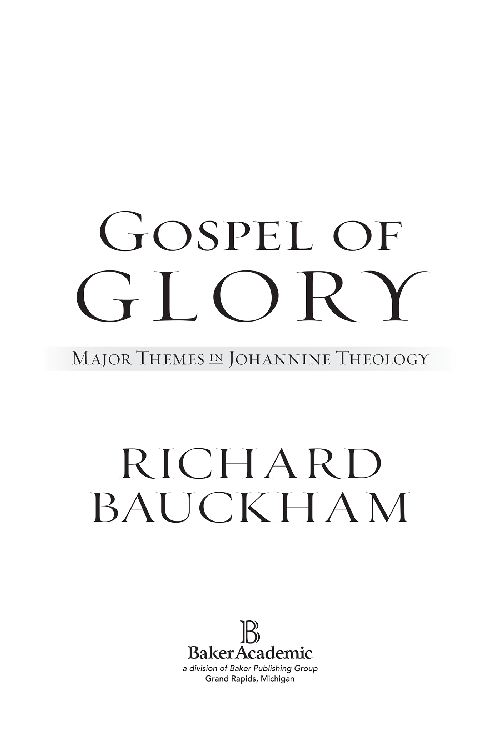
2015 by Richard Bauckham
Published by Baker Academic
a division of Baker Publishing Group
PO Box 6287, Grand Rapids, MI 49516-6287
www.bakeracademic.com
Ebook edition created 2015
All rights reserved. No part of this publication may be reproduced, stored in a retrieval system, or transmitted in any form or by any meansfor example, electronic, photocopy, recordingwithout the prior written permission of the publisher. The only exception is brief quotations in printed reviews.
ISBN 978-1-4412-2708-9
Library of Congress Cataloging-in-Publication Data is on file at the Library of Congress, Washington, DC.
Unless otherwise indicated, all Scripture quotations are from the New Revised Standard Version of the Bible, copyright 1989, by the Division of Christian Education of the National Council of the Churches of Christ in the United States of America. Used by permission. All rights reserved.
I read Gospel of Glory with great pleasure and with my own commentary on John within reach. I found frequent agreement, occasional disagreement, and, on every page, enrichment. The first chapter alone (individualism in Johns Gospel) is worth the price of the book. The chapter on the Gospels first week offers a fascinating glimpse of what Bauckhams forthcoming commentary on John may look like, and yet Gospel of Glory is no mere appetizer but a meal in itself.
J. Ramsey Michaels , Missouri State University, Springfield
From individual to community, from glory to the cross, from sacraments to dualism, from the call of the disciples to their later witness, Gospel of Glory breaks new ground. Not only is Johns narrative now welcomed to be read alongside the Synoptics in discerning the Jesus of history, but the Synoptics can now be read side by side fruitfully as informing the Christ of faith. Readers of Johns Gospeland of the otherswill want to read this book!
Paul N. Anderson , George Fox University
Dedicated to the memory of the great
British Johannine scholars:
Brooke Foss Westcott
Edwyn Clement Hoskyns
Charles Harold Dodd
John Arthur Thomas Robinson
Barnabas Lindars
Charles Kingsley Barrett
Contents
Preface
In this volume, I do not attempt a comprehensive coverage of the theology of Johns Gospel but focus on some major themes, including some that have been much neglected and others that have been very much debated during the last century of New Testament scholarship. The most neglected of the topics I tackle is what in chapter 1 I call the individualism of the Gospel of John. (I put the term in quotes to indicate that it does not refer to the kind of individualism that characterizes contemporary Western culture.) This is a prominent aspect of the Gospel that most recent scholars have managed to ignore, probably because it is the last thing they would expect to find in John. Working on this topic, I became aware that in order to do justice to the Gospel, we must recognize that it lays emphasis both on the individual believer and on the community of believers. We should not allow either to cancel out the other. But the theme of community in John has the added dimension of characterizing Johns understanding of God as well as his understanding of believers, and so chapter 2 explores the relationship of divine and human community.
Most Johannine scholars recognize that glory is a key term in the Gospel of John, but there are few extended treatments of it. Chapter 3 therefore offers an analytical overview of this theme. The cross of Christ, on the other hand, along with his resurrection and exaltation, has received a great deal of attention, not least in the commentaries. But in chapter 4 I have adopted a fresh approach by viewing the cross and the resurrection/exaltation of Jesus in relation to four key themes of the Gospel: love, life, glory, and truth. I believe this approach throws fresh light on Johns understanding of the key events in his christological story. Chapters 5 (Sacraments?) and 6 (Dualisms) treat aspects of Johns theology that have proved highly problematic and debatable in Johannine scholarship. There is nothing approaching a scholarly consensus on sacraments in John, not even on whether there is a sacramental aspect to his theology at all. This topic requires some methodological rigor if it is to be significantly clarified. In the title of chapter 6, I have used the plural noun in contrast to the usual talk of Johannine dualism. Discussion of this topic has suffered from oversimplification. By making distinctions between different kinds of duality in John, I hope to clarify the roles they play in his theology.
Chapter 7 adopts a quite different approach, focusing not on a theme but on a key section of the Gospels narrative (1:192:11). The aim is to illuminate the way theological meaning is conveyed by narrative in this Gospel, one very remarkable feature of which is the wide range of additional dimensions of meaning beyond the literal meaning that the narratives are constructed to evoke. Finally, chapter 8 takes up the issue of the differences between the Johannine Jesus and the Jesus(es) of the Synoptic Gospels, not as an issue about the historical Jesus but as an issue about how Christian readers of the Gospels can read the four different Gospels as providing complementary angles on the ultimately one Christ of faith. It is a serious failure of Gospels scholarship in the service of the church and Christian faith that scholars seem commonly quite content to emphasize the distinctive portrayal of Jesus in each Gospel without facing the subsequent question: what are Christian believers to do with this diversity? This chapter is a first approach to reflection on how the diversity within the fourfold Gospel canon can function for Christian faith and theology that takes that fourfold canon seriously as its means of access to the one Jesus Christ who is the same yesterday, today, and forever.
Each chapter of this book is a self-contained essay, and so the chapters can be read in any order. Readers who are interested in my approach to such questions as the historical origins and context of the Gospel can turn to my earlier collection of essays and in particular its introduction. In the present volume, I have left aside all such questions in order to focus entirely on the theological content of the Gospel.
Most of the chapters have a prehistory. The origins of chapter 1 lie in the third C. F. D. Moule Memorial Lecture, entitled John: A Gospel for Individualists?, which I gave in June 2010 at Ridley Hall, Cambridge. (It was inspired by a significant but neglected article by Moule.) In a later incarnation, this lecture became the Graham Stanton Memorial Lecture, given in September 2010 in Bangor, Wales, at the British New Testament Conference of that year. I was delighted to be able to honor these two great New Testament scholars, the latter a pupil of the former. Chapter 2 was designed as a companion to chapter 1, and I gave the two lectures at Western Theological Seminary, Holland, Michigan, in January 2012, when I also gave the lecture on which chapter 2 is based at the University of Notre Dame, South Bend, Indiana. This lecture made another appearance in the New Testament seminar at the University of Durham in February 2012. In 2013 I gave the Trinity Lectures at Trinity College, Singapore, under the title Aspects of the Theology of Johns Gospel. The four lectures in the series were those on which chapters 1, 2, 3, and 8 of this book are based. Chapter 8 also formed the Henton Davies Lecture for 2014, given at Regents Park College, Oxford. I am very grateful to my hosts and my audiences on these various occasions, for making them enjoyable events and for the stimulating comments and questions I received. Finally, chapter 4 originated as a paper for a small symposium on the Gospel of John that took place at Madingley Hall, Cambridge, in January 2014. The highly interdisciplinary discussions of the small group of people chosen and gathered by David Ford for that occasion went beyond the confines of the discussions New Testament scholars usually have among themselves and proved very rewarding.
Next pageFont size:
Interval:
Bookmark:
Similar books «Gospel of Glory»
Look at similar books to Gospel of Glory. We have selected literature similar in name and meaning in the hope of providing readers with more options to find new, interesting, not yet read works.
Discussion, reviews of the book Gospel of Glory and just readers' own opinions. Leave your comments, write what you think about the work, its meaning or the main characters. Specify what exactly you liked and what you didn't like, and why you think so.

